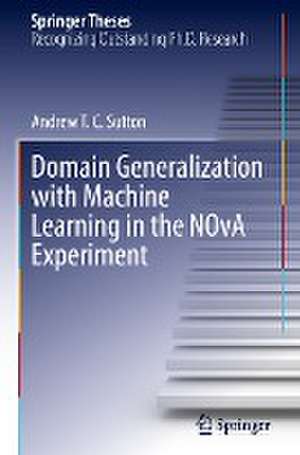Domain Generalization with Machine Learning in the NOvA Experiment: Springer Theses
Autor Andrew T.C. Suttonen Limba Engleză Hardback – 9 noi 2023
Din seria Springer Theses
- 18%
 Preț: 997.88 lei
Preț: 997.88 lei -
 Preț: 389.88 lei
Preț: 389.88 lei - 15%
 Preț: 646.94 lei
Preț: 646.94 lei - 18%
 Preț: 943.43 lei
Preț: 943.43 lei -
 Preț: 399.29 lei
Preț: 399.29 lei - 18%
 Preț: 944.99 lei
Preț: 944.99 lei - 15%
 Preț: 636.80 lei
Preț: 636.80 lei - 18%
 Preț: 941.05 lei
Preț: 941.05 lei - 15%
 Preț: 643.16 lei
Preț: 643.16 lei - 15%
 Preț: 642.68 lei
Preț: 642.68 lei - 18%
 Preț: 1103.62 lei
Preț: 1103.62 lei - 20%
 Preț: 558.82 lei
Preț: 558.82 lei - 18%
 Preț: 1112.30 lei
Preț: 1112.30 lei - 18%
 Preț: 944.19 lei
Preț: 944.19 lei - 18%
 Preț: 1109.92 lei
Preț: 1109.92 lei - 18%
 Preț: 1217.27 lei
Preț: 1217.27 lei - 15%
 Preț: 640.06 lei
Preț: 640.06 lei - 15%
 Preț: 636.45 lei
Preț: 636.45 lei - 15%
 Preț: 640.06 lei
Preț: 640.06 lei - 15%
 Preț: 640.88 lei
Preț: 640.88 lei -
 Preț: 389.70 lei
Preț: 389.70 lei - 20%
 Preț: 563.89 lei
Preț: 563.89 lei -
 Preț: 393.35 lei
Preț: 393.35 lei - 15%
 Preț: 637.93 lei
Preț: 637.93 lei - 15%
 Preț: 641.85 lei
Preț: 641.85 lei - 18%
 Preț: 1225.94 lei
Preț: 1225.94 lei - 20%
 Preț: 551.36 lei
Preț: 551.36 lei - 18%
 Preț: 1229.10 lei
Preț: 1229.10 lei - 15%
 Preț: 639.25 lei
Preț: 639.25 lei - 18%
 Preț: 999.45 lei
Preț: 999.45 lei - 15%
 Preț: 640.06 lei
Preț: 640.06 lei - 18%
 Preț: 1220.45 lei
Preț: 1220.45 lei - 18%
 Preț: 1116.26 lei
Preț: 1116.26 lei - 18%
 Preț: 1110.72 lei
Preț: 1110.72 lei - 18%
 Preț: 1000.87 lei
Preț: 1000.87 lei - 18%
 Preț: 891.17 lei
Preț: 891.17 lei - 15%
 Preț: 640.06 lei
Preț: 640.06 lei - 5%
 Preț: 1154.07 lei
Preț: 1154.07 lei - 15%
 Preț: 635.96 lei
Preț: 635.96 lei - 15%
 Preț: 640.88 lei
Preț: 640.88 lei -
 Preț: 387.20 lei
Preț: 387.20 lei - 18%
 Preț: 1109.92 lei
Preț: 1109.92 lei -
 Preț: 385.25 lei
Preț: 385.25 lei -
 Preț: 385.25 lei
Preț: 385.25 lei - 18%
 Preț: 1112.30 lei
Preț: 1112.30 lei - 18%
 Preț: 999.45 lei
Preț: 999.45 lei -
 Preț: 386.99 lei
Preț: 386.99 lei - 15%
 Preț: 637.13 lei
Preț: 637.13 lei - 20%
 Preț: 554.20 lei
Preț: 554.20 lei - 20%
 Preț: 555.57 lei
Preț: 555.57 lei
Preț: 945.14 lei
Preț vechi: 1152.61 lei
-18% Nou
Puncte Express: 1418
Preț estimativ în valută:
180.86€ • 189.46$ • 149.89£
180.86€ • 189.46$ • 149.89£
Carte tipărită la comandă
Livrare economică 08-22 aprilie
Preluare comenzi: 021 569.72.76
Specificații
ISBN-13: 9783031435829
ISBN-10: 3031435826
Ilustrații: XI, 170 p. 73 illus., 63 illus. in color.
Dimensiuni: 155 x 235 mm
Greutate: 0.44 kg
Ediția:1st ed. 2023
Editura: Springer Nature Switzerland
Colecția Springer
Seria Springer Theses
Locul publicării:Cham, Switzerland
ISBN-10: 3031435826
Ilustrații: XI, 170 p. 73 illus., 63 illus. in color.
Dimensiuni: 155 x 235 mm
Greutate: 0.44 kg
Ediția:1st ed. 2023
Editura: Springer Nature Switzerland
Colecția Springer
Seria Springer Theses
Locul publicării:Cham, Switzerland
Cuprins
Chapter 1: Neutrinos: A Desperate Remedy.- Chapter 2. A Review of Neutrino Physics.- Chapter 3. The NOvA Experiment.- Chapter 4. Event Reconstruction.- Chapter 5. The 3-Flavor Analysis.- Chapter 6. A Long Short-Term Memory Neural Network.- Chapter 7. Domain Generalization by Adversarial Training.- Chapter 8. Conclusion.
Notă biografică
I am an experimental particle physicist focusing on neutrino physics as part of the NOvA and ANNIE experiments located at the Fermi National Accelerator Laboratory (Fermilab) in Batavia Illinois, USA. After graduating cum laude from the University of North Carolina at Charlotte with scientific bachelor degrees in Mechanical Engineering and Physics, I went on to pursue my Ph.D. at the University of Virginia in Charlottesville Virginia. Under the supervision of Craig Group, I studied neutrino physics as a member of the NOvA collaboration. Putting my engineering degree to good use, I received the US Department of Energy Office of Science Graduate Student Research Award to travel to Fermilab and assist in the construction of a Test Beam experiment for NOvA. Alongside the NOvA Test Beam, I also contributed to the main 3-flavor oscillation analysis and was selected as part of the three-person writing committee to draft the paper summarizing our 2020 results (M.A Acero et al. 2022, doi: 10.1103/PhysRevD.106.032004). My graduate education culminated in the machine learning project detailed in this book, which focuses on a technique to train more robust neural networks and reduce the impact of systematic uncertainties that limit the precision of our measurements.
Textul de pe ultima copertă
This thesis presents significant advances in the use of neural networks to study the properties of neutrinos. Machine learning tools like neural networks (NN) can be used to identify the particle types or determine their energies in detectors such as those used in the NOvA neutrino experiment, which studies changes in a beam of neutrinos as it propagates approximately 800 km through the earth. NOvA relies heavily on simulations of the physics processes and the detector response; these simulations work well, but do not match the real experiment perfectly. Thus, neural networks trained on simulated datasets must include systematic uncertainties that account for possible imperfections in the simulation. This thesis presents the first application in HEP of adversarial domain generalization to a regression neural network. Applying domain generalization to problems with large systematic variations will reduce the impact of uncertainties while avoiding the risk of falselyconstraining the phase space. Reducing the impact of systematic uncertainties makes NOvA analysis more robust, and improves the significance of experimental results.
Caracteristici
Nominated as an outstanding thesis by the University of Virginia, USA Reviews the history and physics of the neutrino Shows how domain generalization can reduce the impact of uncertainties in HEP experiments
